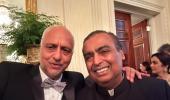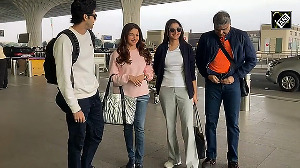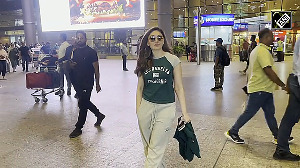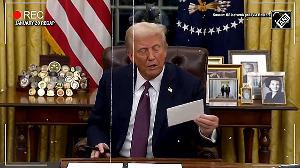'I told President Obama, "Mr President, do you realise that the person who is likely to become the prime minister of India in two weeks, does not have a visa, and you are talking about having great relations between India and the USA, how are you going to do it?".'
'His answer was that this is not right and that he'll have somebody from the White House and the State Department reach out to me.'

The doors of his home in Chicago have been open to Bharatiya Janata Party since the early 1990s.
The physician couple, Dr Panna and Dr Bharat Barai, in the past have hosted L K Advani, Murli Manohar Joshi, Sikander Bakht and Narendra D Modi.
During his State visit to the United States last month, while speaking to United States Congressmen Ro Khanna and Shri Thanedar, Prime Minister Modi told them about his stay at Dr Barai's house in Chicago in 1993.
Bursting in laughter half way through the story, the prime minister pointed to Dr Barai standing in a corner of the room, asking him to complete the story about his visit as a mere karyakarta.
Dr Barai, who is instrumental in organising Indian American community and multiple diaspora events in the United States each time Modi visits the US, speaks about his long association with the karyakarta who is now the prime minister of India to Rediff.com US Contributor Abhijit Masih.
Gifted with an impressive memory, he recalls the many incidents that have endeared him to the Indian leader and what keeps their relationship intact.
Since when do you know Prime Minister Modi and how did this friendship begin?
Thirty years ago in 1993, when it was Swami Vivekananda's anniversary speech to the parliaments of religion, he came as a BJP karyakarta.
They didn't have any resources, so he stayed with us for almost 10 days. I took him around. So we know each other since then.
Do you recall anything about him from the visit in 1993?
In fact, when he was sitting down with Congressmen in the side room at the Ronald Reagan Center (on June 23, 2023), during the State visit, he himself told them he had nothing and was describing his own career as a karyakarta.
He pointed out to me standing in the corner of the room, and told them he stayed at my house.
He also narrated to them a cute story about that visit.
That he had come with only a 22 inch bag when he came to Chicago.
We were kind of shocked that all he has is a 22 inch suitcase.
Then he had told my wife in Gujarati, "Panna ben, I know that you do the laundry every weekend, but I have only two pairs of clothes. So can you do my laundry every day?"
That's how simple he was. Every morning we used to sit down and we used to have chai pe charcha 30 years ago.
What was the impression you had of the simple karyakarta and did you imagine then that he would one day become the prime ,inister of India?
What did impress me at that time; he would discuss a lot of things about India and about all the problems of India.
But then he used to always say, we can do like this, we can do like that.
So that reminded me of the famous saying, I know of the 99 problems, but I'm looking for that one solution.
That was what impressed me. He was very crisp in his thoughts.
Obviously, I never thought that he'll become prime minister of India someday.

How have you stayed connected through the years?
I used to meet him when he was chief minister of Gujarat. There was a lot of propaganda against him about the Gujarat riots. And we used to clarify what happened.
We used to keep him in touch with the diaspora.
In 2005, he was supposed to come here; there was a meeting that was planned with the diaspora in New York.
I was 1/10th sponsor at the time. Then suddenly, we got the news that his visa was denied.
So we asked him, can you do a live telecast from India? So everybody came and he addressed it live.
Then whenever I visited India, I'll stop by and make a courtesy call on him.
You raised the visa issue with the US State Department. What explanation did you present to them?
That this was very unfair. Riots have occurred in every part of India. There is nothing that he could have done and the provocation was so grave, burning alive 59 people, there are bound to be reactions.
I would say neither act was justified.
To say that the chief minister is responsible, in that way in 1993 in Maharashtra, 2,000 people were killed.
But that was a Congress chief minister. Nobody asked him to resign.
In the elections that followed, the BJP got elected with a lot more seats.

How did you help in the US granting Mr Modi a US visa?
I got an opportunity to talk with President Obama. He knew me since he is from the Chicago area.
He gave me a few minutes where I sat down with him in April 2014, just two weeks before general elections in India.
I explained to him the strategic significance.
I said, "Mr President, do you realise that the person who is likely to become the prime minister of India in two weeks, does not have a visa, and you are talking about having great relations between India and the USA, how are you going to do it?"
His answer was that this is not right and that he'll have somebody from the White House and the State Department reach out to me.
They arranged a meeting on May 11, 2014. I met that person and explained to him.
That person is no longer at the State Department and was later appointed ambassador to India.
I met the same person at the White House last Thursday (June 22, 2023). He remarked "Dr Barai, what we did that day in 2014, made this day possible."
You've known Mr Modi for so long. You've met him as a simple karyakarta and as the prime minister of India. How would you describe him as a person?
He was always a clean man. One thing I do is never get involved in any business talk. Because I know it will cut off my relationship nor am I interested.
I'm a doctor. I have no business interest. That has helped us quite a bit.
One good point is we have no conflict of interest. We don't do any business with government.
We don't ask any favours from the Indian government.
The good part is most Indians in the USA have very high regard for Narendra Modi.
- Part III: 'Modi hasn't forgotten his human touch'
Feature Presentation: Aslam Hunani/Rediff.com











 © 2025
© 2025